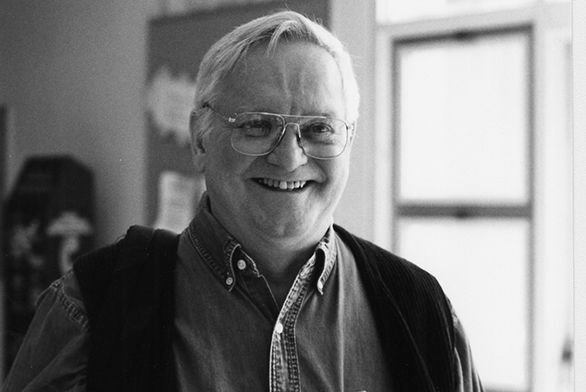Alumni Dedicate Endowment to Former Tutor
May 24, 2018 | By Anne Kniggendorf (SF97)

Sometimes a particular tutor, professor, teacher, or mentor can mean nearly as much to a student as his or her own parent. For Tucker Feller (SFGI78) that person was tutor Jack Steadman, who passed away in 2010.
Tucker says that what he learned at St. John’s College, particularly from Mr. Steadman, changed how he understands the world. And even though no amount of money can repay an impact of this magnitude, he set up an endowment in Mr. Steadman’s name, which is used for scholarships.
Tucker found St. John’s as a junior in high school and spent a year working on his admissions essays. He worked on them for so long, and gave them to so many people for editing, that the college was skeptical of the resultant products and asked him to sign a statement swearing that he’d really written them.
The logic of asking a potential plagiarist to swear he hadn’t plagiarized—i.e. asking a suspected liar to swear he hadn’t lied—struck Tucker as absurd. He didn’t sign the paper and he didn’t go to St. John’s.
Instead, he spent 10 years at Carleton University, more or less attempting to recreate the St. John’s Program. At one time or another he took courses in physics, literature, sociology, religion, music, psychology, history of the humanities, philosophy, and mathematics. He was afraid to take the number of courses in any one discipline that would allow the university to graduate him, until his self-designed liberal arts program was completed. He met with faculty and took courses from outstanding thinkers irrespective of what they taught. “It was an education I was seeking, not a degree,” he says.
He was in his 30s by the time he attended the St. John’s Graduate Institute.
Similarly, Matthew Freytag (SFGI78) discovered St. John’s as a high school student in southeastern Pennsylvania but also was unable to attend until he finished an undergraduate degree in philosophy at Penn State, followed by myriad jobs, including stints on Mississippi riverboats and Oklahoma oil rigs, saving enough money to study the great works of the Western intellectual tradition.
The two met Steadman and each other during their first semester at the Graduate Institute.
Matthew says that Steadman’s “approach to conversation was lovely and illuminating.”
One comment in particular made by Steadman has proved meaningful and useful for Matthew both in his personal life and as a professor of philosophy at the University of Maine.
Steadman once cautioned them: The seminar is not about your opinions or disagreements with Aristotle. Instead, consider the question: “Why would an intelligent person say that?”
Matthew found that “this question forces one to try to reproduce the train of thought that has led to such statements. It’s an amazingly fertile habit of mind to ask that question.”
At the time, the college had a program that allowed students to take tutors to lunch with special coupons. Each student received two tickets. Tucker felt that wasn’t enough.

He recalls saying to Matthew, “Let’s combine our lunches and we can have twice the access. I’ll attend your meetings and you attend mine.”
It turned out the program was not universally embraced; many students weren’t using their tickets. He and Matthew collected as many coupons as they could. “Soon, we had enough tickets for every lunch, and I started negotiating for weekends and suppers. Poor Jack. I owned more of his time than his family,” Tucker says.
The three of them spent an enormous and insufficient amount of time together.
One time, a speaker from Harvard visited St. John’s. He maintained that there was no absolute truth. Rather, he said, we each had our own truth. During the Q&A, Mr. Steadman asked him: “Is it true that all truth is relative?” The speaker replied: “Absolutely” to the delight of the attendees.
Matthew says his time at St. John’s was “golden”; thus he knows that contributing to this endowment was the right choice for him.
Tucker recalls: “Sometimes I am awash in my respect and admiration for a brilliant man taken too soon. The endowment is perhaps an utterance on how much I miss Jack and how much I thank the college.”
This story has been edited to include additional information.

